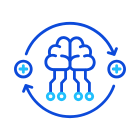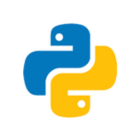AI+ Gaming™
AP- 6011
Discover how AI transforms game design, player engagement, and virtual environments. Build real-world gaming projects using cutting-edge AI technologies.- Comprehensive Skill Development Master AI-driven game design, adaptive storytelling, and intelligent NPC development to create immersive, data-enhanced gaming experiences.
- Industry Recognition Earn a globally recognized certification that validates your expertise in integrating artificial intelligence within modern gaming environments.
- Hands-On Learning Work on real-world gaming projects, from AI-based character behavior modeling to predictive player analytics, enhancing creativity and technical precision.
- Career Advancement Unlock career opportunities in game development, AI simulation design, virtual production, and interactive entertainment industries.
- Future-Ready Expertise Stay at the forefront of gaming innovation with cutting-edge knowledge in generative AI, immersive simulations, and intelligent gameplay systems.
Why This Certification Matters
At a Glance: Course + Exam Overview
- Instructor-Led: 1 day (live or virtual)
- Self-Paced: 8 hours of content

Who Should Enroll?
Aspiring Game Developers – Ideal for those looking to integrate AI into game design and development.
AI Enthusiasts – Perfect for learners eager to explore how AI shapes gaming experiences and player interactions.
Game Designers – Suited for creatives aiming to use AI for storytelling, dynamic worlds, and adaptive gameplay.
Software Engineers – Great for professionals seeking to apply programming and AI techniques within the gaming industry.
Students & Researchers – Beneficial for those pursuing studies or research in AI, machine learning, or interactive entertainment.
Skills You’ll Gain
- AI & Machine Learning for Games
- Procedural Content Generation
- Player Behavior Analysis
- Natural Language Processing for NPCs
- Computer Vision in Virtual Environments
- Game Data Analytics
- Reinforcement Learning for Gameplay
- Adaptive Difficulty Systems
- Intelligent Game Design Automation
What You'll Learn
- 1.1 What is AI?
- 1.2 Evolution of AI in the Gaming Industry
- 1.3 Types of AI in Games
- 1.4 Benefits, Challenges, and Innovations in Game AI
- 2.1 Understanding Game Mechanics and Player Experience
- 2.2 Role of AI in Gameplay and Narrative Design
- 2.3 Designing Game Environments for AI Interaction
- 2.4 AI-Driven Behavior vs Traditional Scripted Logic
- 2.5 Case Study: Dynamic AI and Narrative Adaptation in Middle earth: Shadow of Mordor
- 2.6 Hands-On Exercise: Designing Adaptive NPC Behavior and Environment Interaction
- 3.1 Core AI Concepts for Gaming
- 3.2 Search Algorithms and Pathfinding
- 3.3 AI Behavior Modeling and Procedural Content Generation (PCG)
- 3.4 Introduction to Machine Learning and Reinforcement Learning
- 3.5 Case Study: AI in Minecraft — Procedural Content Generation and Agent Navigation
- 3.6 Hands-On: Implementing A* Pathfinding and FSM for NPC Behavior
- 4.1 Core Concepts: States, Actions, Rewards, Policies, Q-Learning:
- 4.2 Exploration versus Exploitation in Learning Systems:
- 4.3 Overview of Deep Q Networks (DQN) and Policy Gradient Methods
- 4.4 Case Study: Reinforcement Learning in DeepMind’s AlphaGo
- 4.5 Hands-On: Train a Reinforcement Learning Model on OpenAI Gym’s GridWorld
- 5.1 Minimax Algorithm and Alpha-Beta Pruning
- 5.2 Monte Carlo Tree Search (MCTS)
- 5.3 Applications in Board Games and Real-Time Strategy (RTS) Games
- 5.4 Case Study: Strategic AI in StarCraft II – Combining Planning Algorithms for Real-Time Strategy
- 5.5 Hands-on Implementation: Guides on implementing the Minimax algorithm for Tic-Tac-Toe
- 6.1 Overview of 2D and 3D Game Environments
- 6.2 Environment Representation Techniques
- 6.3 Navigation and Pathfinding in 2D/3D Spaces
- 6.4 Interaction and Behavior Systems in Virtual Environments
- 6.5 Case Study: Navigation and Interaction AI in The Legend of Zelda: Breath of the Wild
- 6.6 Hands-On: Building Basic Navigation and Interaction in 2D and 3D Game Environments
- 7.1 Adaptive Systems Overview
- 7.2 Dynamic Difficulty Adjustment (DDA) Principles
- 7.3 Adaptive Storytelling, Personalization, and Player Profiling
- 7.4 AI Techniques in Adaptive Systems
- 7.5 Implementation Strategies and Tools
- 7.6 Case Study: Dynamic Enemy Management and Replayability with Left 4 Dead’s AI Director
- 7.7 Hands-On: Developing an Adaptive Dynamic Difficulty System in Unity
- 8.1 Generalist AI Agents and Transfer Learning
- 8.2 AI-Powered Game Design and Testing Tools
- 8.3 Ethical Considerations and AI Transparency
- 8.4 Emerging Technologies: VR/AR AI and AI in Esports Coaching
Tools You'll Explore

Unity ML-Agents

TensorFlow

PyTorch

Python

OpenAI Gym

Blender

NVIDIA DeepStream

Reinforcement Learning Frameworks

Natural Language Processing Libraries

Computer Vision SDKs

Game Data Analytics Tools

Behavior Tree Editors
Prerequisites
- Basic Programming Skills – Comfortable with Python or similar languages.
- Foundational Math Knowledge – Understanding of linear algebra and probability.
- Intro to Machine Learning – Familiarity with ML concepts and algorithms.
- Game Development Exposure – Experience with Unity or Unreal Engine basics.
- Problem-Solving Mindset – Ability to approach challenges creatively and logically.
Exam Details
Duration
90 minutes
Passing Score
70% (35/50)
Format
50 multiple-choice/multiple-response questions
Delivery Method
Online via proctored exam platform (flexible scheduling)
Exam Blueprint
- Introduction to AI in Games – 5%
- Game Design Principles using AI – 11%
- Foundations of AI in Gaming – 12%
- Reinforcement Learning Fundamentals – 12%
- Planning and Decision Making in Games – 12%
- AI Techniques in 2D/3D Virtual Gaming Environments Basic – 12%
- Adaptive Systems and Dynamic Difficulty – 12%
- Future of AI in Gaming – 12%
- Capstone Project – 12%
Choose the Format That Fits Your Schedule
What’s Included (One-Year Subscription + All Updates)
- High-Quality Videos, E-book (PDF & Audio), and Podcasts
- AI Mentor for Personalized Guidance
- Quizzes, Assessments, and Course Resources
- Online Proctored Exam with One Free Retake
- Comprehensive Exam Study Guide
Instructor-Led (Live Virtual/Classroom)
- 1 day of intensive training with live demos
- Real-time Q&A, peer collaboration, and hands-on labs
- Led by AI Certified Trainers and delivered through Authorized Training Partners
Self-Paced Online
- ~8 hours of on-demand video lessons, e-book, podcasts, and interactive labs
- Learn anywhere, anytime, with modular quizzes to track progress
Discover Your Ideal Role-Based Certifications and Programs!
Not sure which certifications to go for? Take our quick assessment to discover the perfect role-based certifications and programs tailored just for you.
Get CertifiedFrequently Asked Questions
Yes, you’ll gain hands-on experience with AI tools for gameplay design, procedural content generation, and player behavior analysis that can be immediately applied in the gaming industry.
This course uniquely combines AI with game development, focusing on adaptive gameplay, intelligent NPCs, and data-driven player engagement to create next-generation gaming experiences.
You’ll work on projects like AI-powered character behavior, procedural level design, predictive player analytics, and a capstone project focused on developing an AI-driven game prototype.
The course blends foundational theory with interactive labs, real-world projects, and case studies to help you effectively apply AI in game design and development.
You’ll develop specialized AI and game development skills that prepare you for roles such as AI Game Developer, Game Data Scientist, or AI Systems Designer in leading gaming studios.


